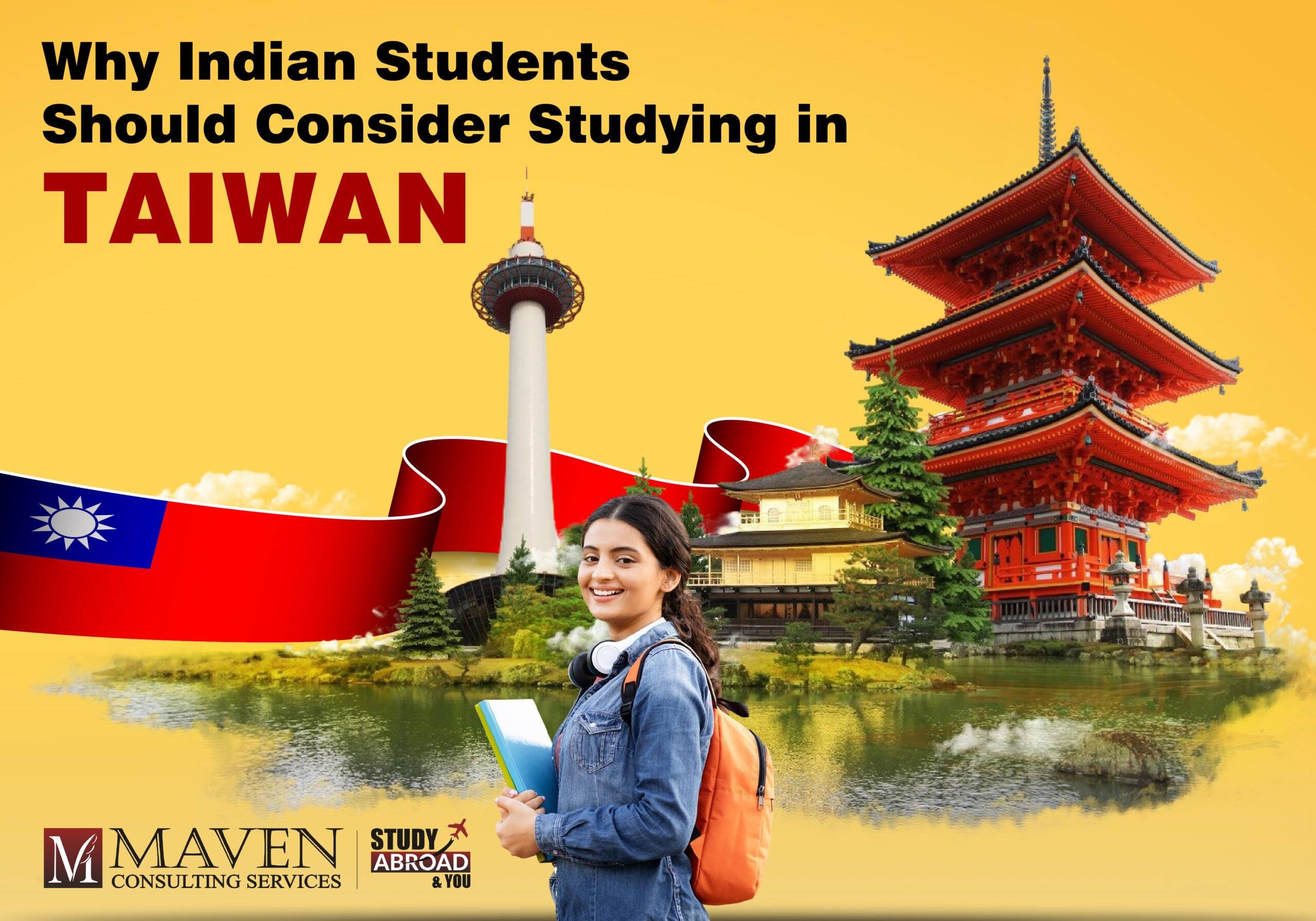WhatsAppCHAT
CALL US& CONNECT

As students apply to universities around the world, they look to Europe and America to access the best culture and academics. However, there’s a hidden gem in Asia where education is top-notch, living costs are affordable, and opportunities are quietly growing. Many people remain unaware and miss out on this opportunity. Taiwan is a destination that is increasingly being discovered by an increasing number of Indian students.
Indian students are choosing to study in Taiwan due to its affordable education, high-quality universities, and growing global recognition. The cost of studying in Taiwan is far lower than in Western countries, and several studies in Taiwan make it even more accessible.
Let’s learn why Taiwan is the right study-abroad option for you, with real info on universities, courses, scholarships, and what life is like as an international student there.
If you’re planning to study in Taiwan, these are names you’ll hear again and again: universities that offer excellent academics, vibrant campuses, and strong global recognition.
Even private universities like Feng Chia University (Taichung) are gaining traction in engineering and Business studies, providing Indian students studying in Taiwan with more options beyond the top public institutions. And the universities we work with
Yes, and this is important. Many Taiwanese universities have dedicated English-taught programs. At NTU, you can take full courses in Engineering, Management, or Life Sciences without needing Mandarin. NCKU and Asia University also run full English tracks.
That said, outside the classroom, you’ll hear Mandarin everywhere in shops, buses, and dorm life. Picking up some basic Chinese will make life smoother (and give you an edge if you later want to work in Asia). Pro tip: Taiwan offers a Huayu Enrichment Scholarship, allowing international students to learn Mandarin. Worth Checking out.
Taiwan offers high-quality education at a fraction of the cost compared to Western countries, making it an attractive choice for Indian students.
Tuition & Academic Fees
Based on the National Taiwan University (NTU) official data:
Undergraduate Programs:
Graduate Programs (Master’s / PhD):
Fees vary by department, often being slightly higher than those for undergraduate programs.
Taipei: Estimated TWD 84,000–113,000 per semester (~USD 2,800–3,767) covering housing, meals, transportation, books, and personal expenses.
Housing:
On-campus double room: TWD 24,500/semester (~USD 817)
On-campus single room: TWD 37,000/semester (~USD 1,234)
Off-campus housing: TWD 35,000–50,000/month (~USD 1,167–1,667)
Other Expenses: Books, insurance, transport, and utilities (~TWD 4,956/semester for National Health Insurance).
| Budget Item | Approx. Cost in TWD / USD | Approx. INR |
| Tuition (Engineering/CS) | TWD 58,940 (~USD 1,970 | INR 1,60,000–1,65,000 per semester |
| Living Costs (5 months, Taipei) | TWD 90,000 (~USD 3,000) | INR 2,40,000 |
| Total (tuition + living) | USD 5,000–6,000 | INR 4,00,000–5,00,000 per semester |
Approximate Costs in INR (for Indian Students). Costs vary by city, housing type, and lifestyle. Smaller towns, such as Tainan, Taichung, and Hsinchu, can reduce living costs by 20–30%. Overall, the cost of studying in Taiwan remains among the lowest in Asia, making it an ideal destination for Indian students seeking an affordable yet world-class education.
Taiwan provides overseas students with some of the most substantial scholarships in Asia. Many are fully supported, receiving stipends, housing, and tuition. These Taiwan scholarships for Indian students make higher education accessible and affordable. Here are the top options Indian students can explore:
Merit-based scholarships are offered by the majority of colleges throughout the admissions process, and maintaining a strong GPA can also help secure funding for later years. For those planning ahead, Taiwan scholarships for Indian students in 2025 are expected to expand further, offering more opportunities for Indian students to study in Taiwan at an affordable rate.
Studying in Taiwan for Indian students isn’t just about engineering; the country offers a wide range of globally recognized programs. Here’s a quick map of fields Indian students often choose:
So whether you’re an engineer, a future diplomat, or a budding entrepreneur, there’s a program that fits.
Alright, so what’s it like once you land there? If you’re planning to study in Taiwan for Indian students, here’s what everyday life feels like:
While the world rapidly catches on to every research opportunity, Taiwan offers excellent post-study work and research options for Indian students:
It’s not all roses, so let’s be honest:
For Indian students, Taiwan is not the “obvious” study-abroad choice—but that’s exactly why it’s worth considering. You get world-class universities, affordable tuition, and scholarships that actually cover your Expenses, and the chance to live in one of Asia’s safest, most vibrant societies.
If you’re interested in engineering, semiconductors, biotechnology, or international relations, Taiwan is a serious option. And even if you want to explore a different path than the crowd heading to Canada or Australia, studying in Taiwan could be the smartest decision you make.
Ready to shortlist universities and scholarships? Book your free consultation now.
Taiwan is emerging as one of Asia’s most research-driven destinations, offering world-class PhD programs in Science, technology, and innovation. Indian students pursuing a PhD in Taiwan benefit from strong research Funding, collaboration with industry leaders such as TSMC and MediaTek, as well as access to state-of-the-art laboratories.
Doctoral studies are now both affordable and internationally recognized, thanks to the comprehensive funding of Taiwan scholarships offered by numerous universities to Indian students.
For those planning to study in Taiwan for higher education, top choices include Engineering, Computer Science, Semiconductor Technology, Biomedical Sciences, Business, and International Relations.
Taiwanese universities, such as NTU, NTHU, and NYCU, are globally ranked in these areas, attracting international students, especially from India, every year.
Yes, degrees from accredited Taiwanese universities are widely recognized in India and across Asia. Students studying IT, management, or engineering programs can easily verify their credentials from home.
Nonetheless, before applying to study in Taiwan, students in specialist disciplines, such as medicine, should verify recognition with the National Medical Commission (NMC) or other relevant professional authorities.
Taiwan offers convenient and reasonably priced housing for Indian students. While there are private housing alternatives nearby, the majority of colleges provide on-campus dorms with modern amenities.
Depending on the city and type of accommodation, housing rates range from NTD 5,000 to 10,000 per month. Living in student dorms not only helps save money but also allows international students to connect with peers from around the world.
Not always. English-taught bachelor’s, master’s, and doctoral degree programs are available at many prestigious universities. Nonetheless, mastering the fundamentals of Mandarin can enhance your everyday life and increase your employability upon graduation.
To support foreign students in learning Mandarin before commencing their degree program, Taiwan offers the Huayu Enrichment Scholarship.
International students must apply for a Resident Visa, also known as a Student Visa, to study in Taiwan. Usually, the following documents are needed:
Once approved, students can convert their visa into an Alien Resident Certificate (ARC) upon arrival, allowing them to stay and study legally throughout their program.

Sunday, October 26, 2025 | The Taj MG Road, Bangalore | 10 AM – 4 PM